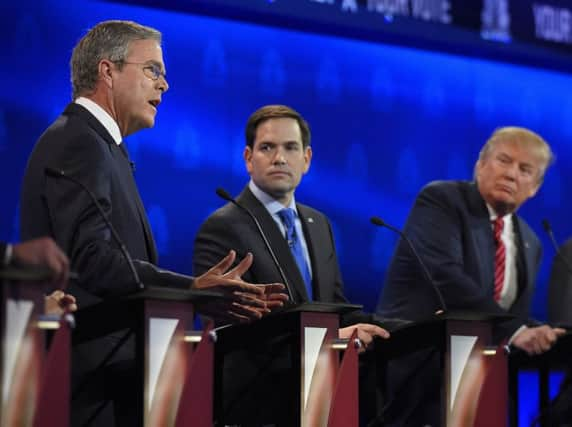Republican presidential race remains three-ring circus


Mr Bush, once considered the front-runner, sought to calm anxious donors with a comeback strategy focused on taking down rival Florida senator Mr Rubio.
But Mr Bush’s plan backfired.
Instead of generating momentum, Mr Bush’s attack on his one-time protégé raised new questions about his candidacy in the primary contest he was once expected to dominate as a member of the Bush dynasty.
Advertisement
Hide AdAdvertisement
Hide AdHis struggles highlight a deepening sense of uncertainty over a 2016 Republican presidential race that remains crowded and without a clear front-runner. Insurgent outsiders Donald Trump and Ben Carson have unexpectedly risen to top the polls, though their performances were patchy on Wednesday night.
In contrast, Hillary Rodham Clinton has been consolidating her position as favourite to win the Democratic nomination.
Even with an estimated $100 million in the bank, Mr Bush headed into Wednesday’s primetime debate at the weakest point of his campaign.
Just five days earlier, the former Florida governor announced deep campaign spending cuts designed to salvage his floundering bid. He slashed salaries by 40 per cent and shifted staff from his Miami headquarters to early voting states. His strategy appear to depend on challenging Mr Rubio.
He mustered an attack on him for missing Senate votes.
“Marco, when you signed up for this, this was a six-year term, and you should be showing up to work. I mean, literally, the Senate – what is it, like a French work week? You get, like, three days where you have to show up? You can campaign, or just resign and let someone else take the job.”
But Mr Rubio was prepared.
The first-term senator, Mr Bush’s junior by 18 years, quickly charged that Mr Bush had praised Arizona Senator John McCain, the 2008 Republican presidential candidate, who has also missed lots of votes.
“I don’t remember you ever complaining about John McCain’s vote record,” Mr Rubio said. “The only reason why you’re doing it now is because we’re running for the same position, and someone has convinced you that attacking me is going to help you.”
He then added: “My campaign is going to be about the future of America, it’s not going to be about attacking anyone else on this stage.”
The crowd cheered. Mr Bush’s team did not.
Advertisement
Hide AdAdvertisement
Hide AdAri Fleischer, who worked in the George W Bush administration, said his brother Jeb should have attacked Donald Trump instead of Mr Rubio. “Mistake going after Rubio,” he tweeted.
Mr Bush never seemed to recover from the exchange, which was just minutes into the debate. Mr Rubio, who has been showing signs of momentum recently, shined.
Mr Rubio continues to face questions about his ability to build a national organisation and raise the money necessary to support it – a problem Mr Bush, as son and brother of former presidents, does not have. Mr Rubio’s campaign could now attract more funds
“This is all part of slowly moving up in the process,” his campaign manager, Terry Sullivan, said. Asked about Mr Bush’s performance, he said, “There’s no need to pile on Governor Bush.”
The other candidates had varied performances.
Retired neurosurgeon Ben Carson, who has led recent polls, struggled to articulate his policies. Mr Trump was on the attack early and often, but also was silent for long stretches. And Texas Senator Ted Cruz earned top marks from the audience and on social media for attacking the media and defending single mothers.
Yet nearly three months before the Iowa caucuses, the race for the 2016 Republican presidential nomination is an unsettled as ever.